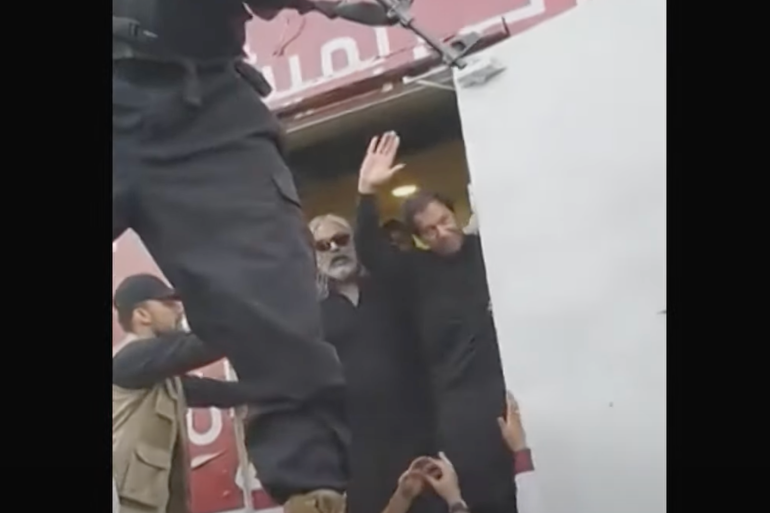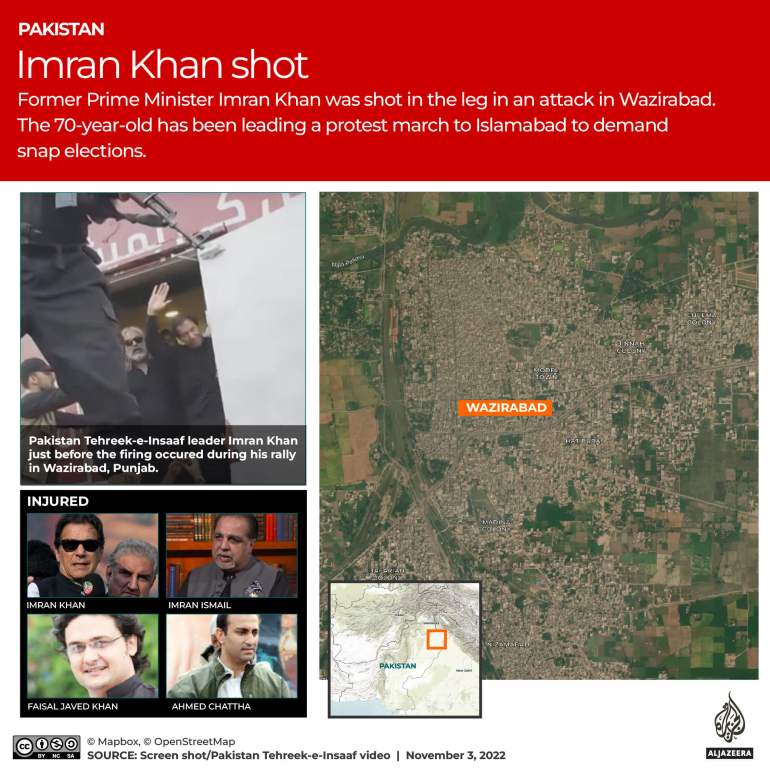Pakistan’s ex-PM Imran Khan shot in leg at protest march
Former prime minister out of danger after shooting attack that killed one of his supporters and wounded some others.

Islamabad, Pakistan – Imran Khan, the former prime minister of Pakistan, has sustained a bullet injury in his leg after a gunman opened fire at a rally in Wazirabad, in the country’s east.
The cricketer-turned-politician, who was leading a protest march demanding snap elections, was out of danger and taken to a hospital in Lahore for treatment, Azhar Mashwani, an official with Khan’s Pakistan Tehreek-e-Insaf (PTI) party, confirmed to Al Jazeera.
Keep reading
list of 4 itemsPakistan court suspends Imran Khan’s prison sentence in state gifts case
Pakistan police crack down on PTI protests over alleged rigging in election
‘Artful dodger’ Asif Ali Zardari wins second term as Pakistan’s president
A total of 14 people were wounded in the incident, according to doctors, while one of Khan’s supporters, identified as Muazzam Nawaz, died after sustaining bullet wounds.
The identity of the suspect, who was arrested by police at the scene, was not immediately clear. No group has claimed responsibility for the attack.
Videos show chaotic scenes as Pakistan’s ex-PM Imran Khan sustained a bullet wound in his leg.
Khan, who was leading a protest march to call for early elections, is said to be in stable condition. pic.twitter.com/ftBvr4AzF2
— Al Jazeera English (@AJEnglish) November 3, 2022
Khan stable: Doctor
Footage on local TV channels showed Khan with a bandaged leg moving from his truck to another vehicle with the help of his security team.
Dr Faisal Sultan, chief executive of Shaukat Khanum Memorial Hospital, built by Khan in memory of his mother, said the PTI leader was in a stable condition and conscious.
Speaking to reporters, Sultan said there were bullet fragments in his leg and his tibia bone was chipped.
“This is only the initial assessment, and we are taking him to the operation theatre for detailed evaluation,” he said, adding a four-member medical board has been formed to monitor and evaluate Khan’s health.
Meanwhile, Prime Minister Shehbaz Sharif issued a statement condemning the incident and asked authorities to immediately launch an investigation.
The Pakistani army also issued a statement, saying the “firing incident” at the protest march “was highly condemnable”.
“Sincere prayers for precious life lost and speedy recovery and well being of Chairman PTI Mr Imran Khan and all those injured in this unfortunate incident.”
Later on Thursday, senior PTI leader Asad Umar released a video in which he said Khan had asked him to reveal the names of three people who were allegedly behind the “assassination attempt”.
“He asked us to release a statement on his behalf, telling us he was already provided information about this plan. He named Prime Minister Shehbaz Sharif, Interior Minister Rana Sanaullah and Major General Faisal [an official of Pakistan’s intelligence agency],” Umar said, without offering any evidence.
Umar further said Khan, who has repeatedly said his life is in danger, demanded the three individuals be removed from their positions or else he would issue a call for nationwide protests.
“We will start this protest the moment Khan asks to, if the demand made by him is not fulfilled,” Umar said.
Khan’s ‘Long March’
Khan began his so-called “Long March” on October 28 from Lahore. The convoy was expected to reach the capital, Islamabad, on November 11.
Journalist Nazar Ul Islam, who has been covering the protest march, was about 100 metres (328 feet) behind Khan’s container when he heard gunshots.
He noted various accidents had happened over the past week at the rallies, including the death of a journalist who slipped and was crushed under Khan’s container on October 30.
“I heard a few gunshots and then heard some ambulances coming. At the time, I thought it was another accident, but when I reached close to the container, I saw panic among the people there and bloodstains on the road,” he told Al Jazeera.
Islam says he was next to the container when a black vehicle parked itself to it and saw Khan stepping out of it.
Imran Khan was shot in the leg but was stable while being taken to hospital. He waived at supporters too. #عمران_خان_ہماری_ریڈ_لائن_ہے pic.twitter.com/XizoAQzPax
— PTI (@PTIofficial) November 3, 2022
“I saw him coming out of the container, waving his hand to the people outside the container as he was helped inside the vehicle.”
After the initial panic subsided, Khan’s supporters showed composure and remained calm.
“The rally continued, and one PTI leader, Fawad Chaudhry, on the container called for revenge,” he said.
Later in a tweet, Chaudhry alleged the attack on Khan was a “well-planned assassination attempt”.
It was a well planned assassination attempt on Imran Khan,the assassin planned to kill Imran khan and leadership of PTI, it was not 9 MM it was burst from automatic weapon, no two opinions about that it was narrow escape
— Ch Fawad Hussain (@fawadchaudhry) November 3, 2022
Meanwhile, PTI supporters blocked highways in various cities while party officials asked them to gather at various spots for protests.
Federal information minister Murriyam Aurangzeb said in a news conference that the interrogation of the suspect was under way.
Aurangzeb also called on political figures to refrain from issuing “political comments” and show “responsibility”.

Khan’s government was removed in April this year through a parliamentary vote of no confidence. The PTI leader has alleged, without providing evidence, that a United States-led foreign conspiracy, in collusion with Pakistan’s military establishment and his rival politicians, were behind his removal.
In recent months, the 70-year-old has been holding rallies across the country, demanding early elections which otherwise are scheduled for next year. Meanwhile, the PTI, on the back of Khan’s surging popularity, has swept multiple by-elections held in July and October.
Last month, Pakistan’s election commission found Khan guilty of “corrupt practices” and disqualified him from being a member of parliament. The PTI has challenged the verdict, while Khan hit out at the chief of the commission, calling him a “dishonest person”.
While Khan’s public statements have usually targeted his political rivals, his criticism of Pakistan’s military establishment – once considered his political patron and architect of his success – has recently been on the rise. He has accused senior military officials of conspiring against his party and demanded they are removed from their position.
The military is often seen as a kingmaker in Pakistan, and has ruled the country of 220 million people directly for more than half of its 75-year history.
Pakistan has a long history of political violence.
Liaqat Ali Khan, the country’s first prime minister, was shot dead soon during a rally in Rawalpindi in 1951.
The former prime minister and founder of Pakistan People’s Party, Zulfikar Ali Bhutto, was hanged in 1979 after his government was overthrown in a military coup.
His daughter, Benazir Bhutto, who also became a two-time prime minister, was assassinated in Rawalpindi in December 2007 while she was campaigning for an election.
Thursday’s shooting came at a precarious time for Pakistan which grapples with the aftermath of catastrophic floods that killed more than 1,730 people and affected 33 million.